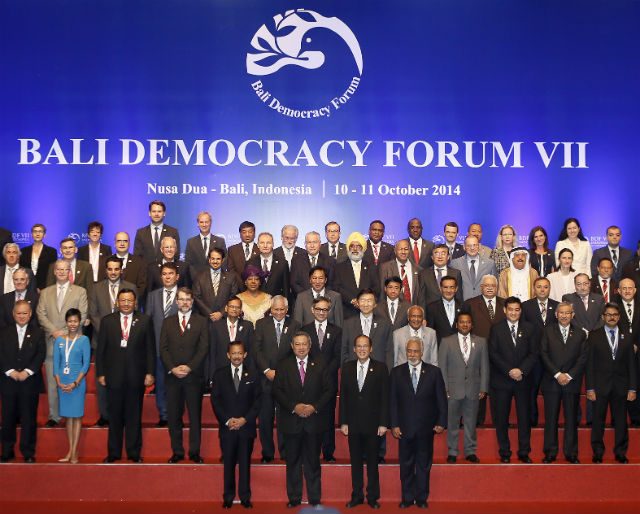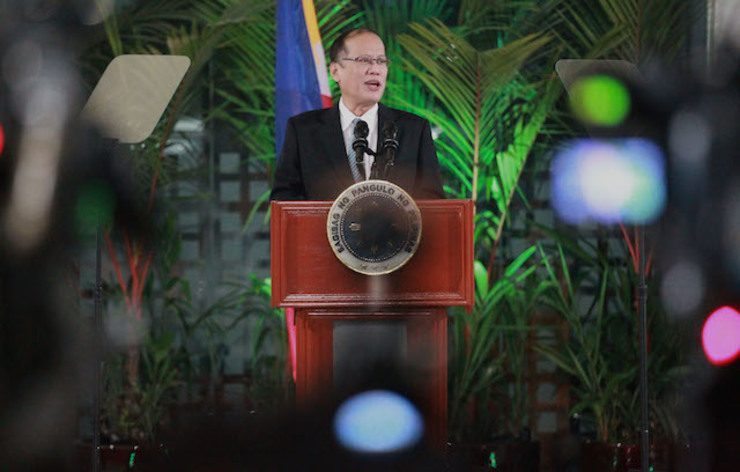SUMMARY
This is AI generated summarization, which may have errors. For context, always refer to the full article.

BALI, Indonesia – Commercial flights are delayed to make way for presidential planes. Bomb squads are seen lounging on Nusa Dua’s manicured gardens. Bali’s hippest clubs get diplomats for guests.
It’s the Bali Democracy Forum again – an annual two-day event initiated by President Susilo Bambang Yudhoyono that brings state leaders and hundreds of diplomats together on the island of the Gods.
This year’s forum from October 10-11, however, is Yudhoyono’s last. He said he would ask his successor, Joko “Jokowi” Widodo, to continue what he has started.
But what exactly is that?
Democratic dialogues and discussions
Simply put, it’s a forum for talking.
7th Bali Democracy Forum
- Yudhoyono: ‘I felt the anger of the people’
- Aquino to regional leaders: Shun temptation of totalitarian rule
- Asian CSOs ‘concerned’ for Indonesian democracy
- ‘What democratic lessons?’ Activists reject Bali Democracy Forum
- Aquino heads to Bali for democracy forum
According to Foreign Minister Marty Natalegawa, the forum is the “sole platform for intergovernmental dialogue and cooperation in political development in Asia.”
And Yudhoyono said this is exactly what it has done: “Contributed to extensive regional dialogue on many strategic issues pertinent to the promotion of democracy.”
In praising the forum, the foreign affairs minister of Vanuatu, Meltek Sato Kilman Livtuvanu, also highlighted how it allowed large and small countries to “gather to discuss and share ideas on democratic principles and practices in our own countries.”
In practice, the Bali Democracy Forum sees different heads of state or diplomats stand behind a podium and deliver prepared speeches on what they think democracy should be and the challenges they face in achieving it.
There are interactive sessions for questions and answers, but as one delegate pointed out, the format doesn’t allow for discussions to go into the level of detail needed for it to be really useful.
Ideally, the forum would also inspire the delegates to chat with each other about issues related to democracy during coffee breaks or over dinner, while being entertained by Balinese dancers.
The idea is that delegates learn from the experiences of other countries in their journey towards a strong democracy.
What has it achieved?
Have all the dialogue and discussion actually advanced democracy in the region? Looking at current and recent events in Indonesia and its backyard, few might be tempted to answer yes to this question.
In Indonesia, this year’s forum has been boycotted by several civil society groups precisely because of democratic setbacks in the country: the removal of direct elections for local executives and the ironic banning of protests during the forum itself.
In Hong Kong, protesters are worried there’s no end in sight to their fight for democratic elections from China, which shared the values of its own brand of “socialist democratic politics with Chinese characteristics” at the forum.
The speech prepared by Ambassador Lu Shumin, the representative of the Chinese foreign minister, stated: “The progress of China’s democratic politics must proceed from its national conditions and realities instead of having blind faith in dogma and punctilious adherence to written rules and directives or mechanically copying Western values and ideas.” (The ambassador wasn’t able to deliver it in full because of time constraints.)
And Thailand is under military rule after the Thai army seized power in a coup in May.
An exercise in promotion
Mostly, as critics have pointed out over the years, the forum serves to boost Indonesia’s image – along with its first democratically elected president, Yudhoyono – in the international community.
“It showcases this region to the rest of the world. It’s a photo opportunity,” one candid minister from an Asian country said. He asked not to be named because he is a diplomat.
It’s an expensive exercise, with security preparations this year alone involving 4,600 military and police personnel, 5 Indonesian warships, 4 F-16 fighter jets, and 4 Sukhoi fighter jets.

If Philippine President Benigno Aquino III’s expenses – P7.1 million ($159,000) for the transportation, accommodation, food, equipment and other requirements of his 47-member delegation which only stayed overnight – are any indication, it’s easy to conclude that millions of dollars are spent for the two-day event.
Is the forum in its current format the best way to showcase Indonesian democracy to the rest of the world? Jokowi – a former furniture exporter and small-town mayor who hasn’t shown any international statesman ambitions and who scoffs at expensive government meeting budgets – could be rethinking it. – Rappler.com
Add a comment
How does this make you feel?
There are no comments yet. Add your comment to start the conversation.